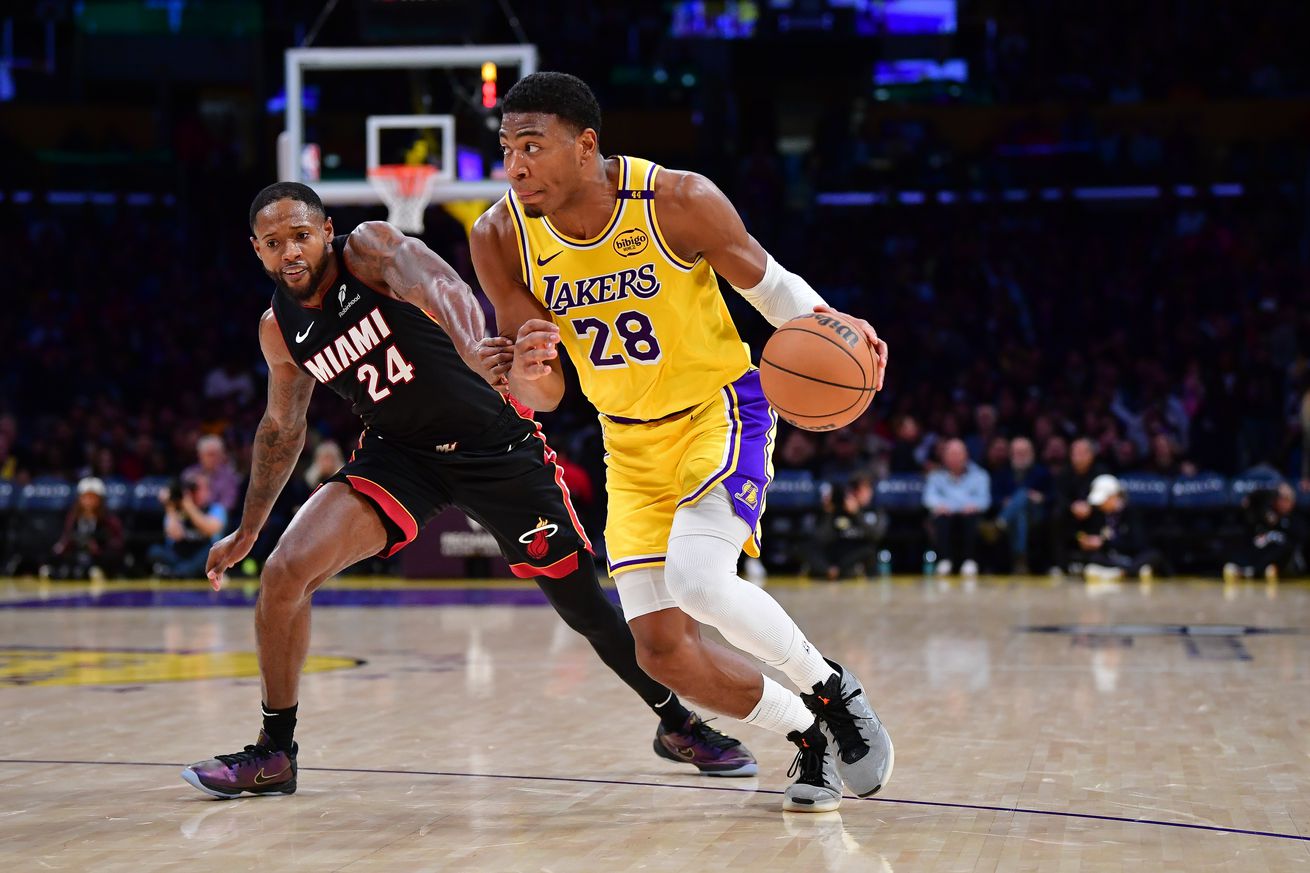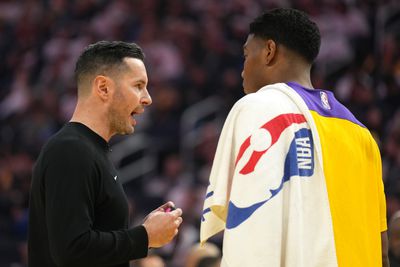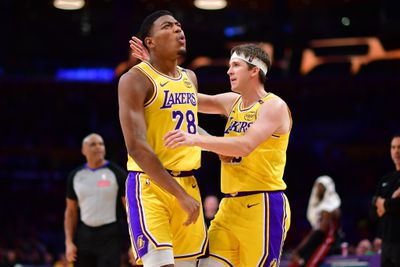
Although it is becoming an increasingly popular sentiment, replacing Rui Hachmura with Dorian Finney-Smith in the starting lineup comes with several pros and cons.
All things have a way of coming back to Rui Hachimura.
He’s the secret sauce when the Lakers are playing well. He’s one of the scapegoats when they’re not. He can sometimes be found with a spear on the front lines or missing in action altogether. The whiplash of his night-to-night variance is his biggest strength and flaw.
This type of inconsistency was meant to change under new head coach JJ Redick. Throughout the summer, Redick stressed optimizing Hachimura, primarily by rounding out his game. Aspects like off-ball play, rebounding, and 3-point shooting all emphasized the importance of creating a sturdy floor he could stand on even on the most turbulent nights.
Unlike last season, Hachimura was also empowered and given more structure from the onset. He’s started in every game he’s appeared in and is averaging the most minutes of his career. And yet, there is still something missing.
The armored body, the soft touch, the explosion, the Colgate smile, all important electrons that just so happen to be missing a nucleus.
The good games tend to make the string of bad ones worth it, especially if the rest of the team is holding up their end of the bargain. But during a rough patch like the Lakers currently find themselves in, that familiar burning desire for him to be more is only growing more bright.
The Lakers made a statement when they traded D’Angelo Russell for Dorian Finney-Smith. Swapping an offensively focused guard for a 3-and-D forward is as stark of an identity shift imaginable. It also raised eyebrows about how the rotation would be impacted, specifically, Hachimura’s role.
In the games that followed the trade, murmurings amongst the fanbase about a starting lineup change and Hachimura’s future with the team began to get louder.
Hachimura’s jumper went cold and the Lakers began to hemorrhage points and losses after reverting to a small-ball, switch-heavy scheme — a strategy Rui has struggled with.
Finney-Smith, on the other hand, acclimated himself well within Redick’s vision for the team. His experience defending multiple positions while playing a low-maintenance offensive role made him an immediate complement next to the team’s stars.
If the Lakers do not right the ship, it does seem inevitable that a Finney-Smith/Hachimura swap in the starting rotation will happen at some point. But should it?
Those in favor of the change could point to Finney-Smith being, in theory, a safer version of Hachimura. His defensive versatility and hot motor give him a baseline of dependability that could add stability and urgency to a starting five that lacks it.
While he is not the dynamic scorer that Hachimura is, Finney-Smith has also proven to be an adequate floor-spacer as he’s converted 41% of his 3-point chances with the team thus far.
There is also an argument that a move to the bench would benefit Hachimura more than anyone else. Playing alongside the likes of LeBron James, Anthony Davis, and Austin Reaves has sapped most of Hachimura’s biggest source of value — his offense.
On the season, Hachimura has attempted just 9.3 shots a game, has the lowest usage rate of his career, and has mostly been an off-ball threat. A whopping 89% of his makes have come off assists from his teammates, up 4% from last year and also a career high.

Darren Yamashita-Imagn Images
To be clear, Hachimura has also benefited from this streamlined role. His shot diet has cleaned up and, by playing next to better players, his shot quality has led to stellar efficiency since arriving in Los Angeles.
However, if his offense is only coming in small doses with the starters, it may be best for both parties if it instead got siphoned over to a second unit in desperate need of scoring.
Even before Russell was traded, the Lakers’ reserves were producing at anemic rates, scoring just 25.3 points a game to start the year. Since then, they’ve only gotten worse, averaging 21.1 points and shooting just 36.8% from the field — the worst mark in the league.
The root of the issue has been a lack of shot-creation in these groups. Due to Russell’s absence, Redick has been forced to stagger James and Reaves to ensure the Lakers have at least one primary on-ball creator on the floor at all times.
As a result, this has taxed James to carry the entire offense at the start of the second and fourth quarters due to the offensive limitations of the team’s backups. The results have not been pretty.
On the season, lineups featuring James when Russell and Reaves have been off the floor have performed horrifically, getting outscored by 17.1 points per 100 possessions and posting a dismal offRTG of 107.1. For context, that would rank 29th in the NBA this year.
Although Hachimura would not help in the ball-handling or playmaking departments, he could serve as a valuable release valve for James and his teammates during these minutes and, in the process, spread his wings with more on-ball chances.
To steal a phrase from the Lakers’ previous head coach — it’s not a demotion but a realignment.

Gary A. Vasquez-Imagn Images
On the other side of the coin, there could be a downside to moving Hachimura to the bench.
While his offense would help juice the barren land that is the second unit, the starting group has also lacked pop and may end up sorely missing his versatility.
Yes, Finney-Smith can make an open three, but there should be concerns (especially in the postseason) with how exploitable his inability to do something else is.
For example, in the Lakers’ recent win over the Heat, Miami attempted to cover Hachimura with a smaller player. Naturally, the Lakers responded by activating Hachimura’s bully function and threw him into the post. And when the Heat went zone, Hachimura’s corner cutting and ability to finish off two feet allowed him to feast.
These are not skills that Finney-Smith can tap into. A defense could confidently stash a guard or big onto him and that could make him a liability. Whether his defense can be stout enough to offset his limitations remains to be seen.
There is also the human element that shouldn’t be ignored. While Hachimura has said all the right things since joining the team, swiftly moving him to a bench in favor of a new player could create cracks in the foundation now and later as Hachimura still time remaining on his deal while Finney-Smith like will be a free agent this summer.
The NBA is a business but that does not mean the interpersonal side of the game is non-important.
Whether a change to the starting lineup happens or not, the conversation should ultimately not be viewed as an indictment of Hachimura or as diminishing his value to the team. The Lakers need him, but perhaps just in a different role.
If Hachimura wants to silence the chatter for now, however, it begins by showing up every night and on every play.
All stats courtesy of Cleaning the Glass unless otherwise stated. You can follow Alex on Twitter at @AlexmRegla.